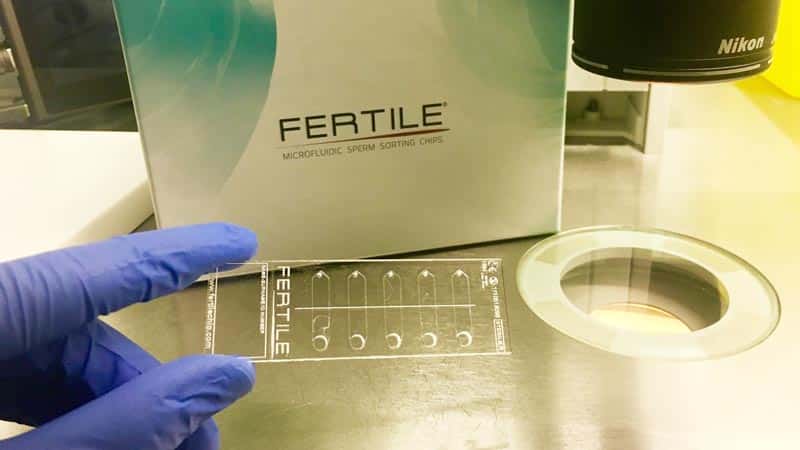
Assisted reproduction
Fertile® chip
Fertile® chip is an advanced sperm selection technique with the objective of choosing the best spermatozoa that will increase the success of IVF treatments.
The Fertile® chip sperm selection technique is suitable for patients with pathological double strand DNA fragmentation in their sperm. This is something which can cause sterility in certain cases. Thanks to Fertile® technology and its ability lto recover the spermatozoa with the best physiological characteristics, patients can improve their chances of becoming parents with their own gametes.
Sperm DNA fragmentation
DNA fragmentation is defined as a break in the strands which form our genetic material. One of the reasons which causes sterility in couples is that the chromosomes provided by the spermatozoa are broken, and this can be single strand – i.e. in only one of the DNA strands – or double – in both DNA strands.
Until now, one of the genetic tests that could be run on sterile couples consisted of sperm DNA fragmentation testing which assessed the fragmentation percentage without differentiating between single and double strand breaks.
Today, after many years of research, it has been proven that double strand breaks have a big effect on sterility and that is why the day-to-day sperm DNA fragmentation testing on sterile couples now entails a differentiation between single strand and double strand.

What does the Fertile® chip technique consist of?
A Fertile® chip is a sperm selection device, shaped like a microscope slide and developed by Harvard University Medical School and the Massachusetts Institute of Technology (MIT). Its function is based on spermatozoa motility.
Spermatozoa without double DNA strand breaks have a characteristic motility and this makes it possible to recover those with a lower fragmentation rate.
Fertile® chip is a special, single-use device with two chambers that are connected via microfluidic channels. The net sperm sample is deposited in one of the chambers and the spermatozoa are recovered in the other chamber
When is Fertile© chip the right technique to use?
According to current studies, patients with prior implantation failure, those with recurrent miscarriages and those with slow embryonic development between day 3 and day 5 of in vitro growth are the right patients for Fertile© chip. Usually, when double strand DNA fragmentation of the sperm is diagnosed in a male, the recommendation is to:
- Evaluate possible prior medical/environmental issues which may be the cause: chemotherapy/radiotherapy treatments, stimulant-rich diet (tea, coffee, chocolate, etc.).
- Administration of a specific oral treatment to treat the double strand fragmentation, over a minimum period of 2-3 months.
Currently, Fertile® chip technology enables us to offer Ginefiv assisted reproduction patients an alternative in the event that the sperm DNA damage cannot be reduced.
The limitations of Fertile® chip
In patients with severe male factor, it is hard to recover sufficient spermatozoa after the technique has been performed, making it unsuitable for such cases. Nor is it recommendable to apply Fertile© chip to previously cryopreserved samples





